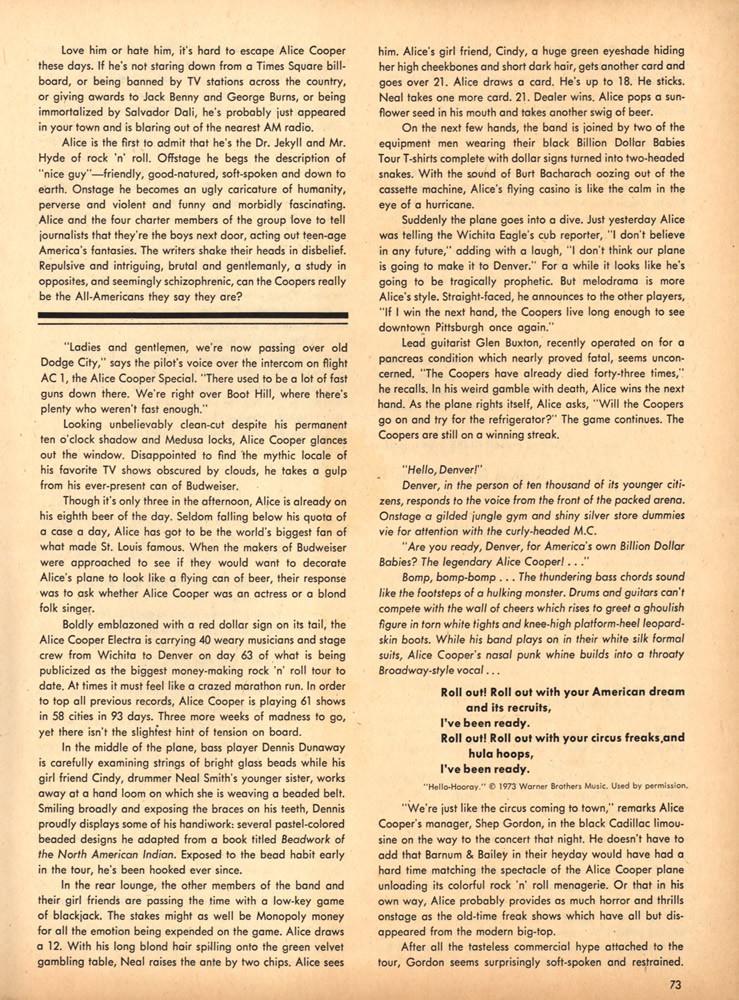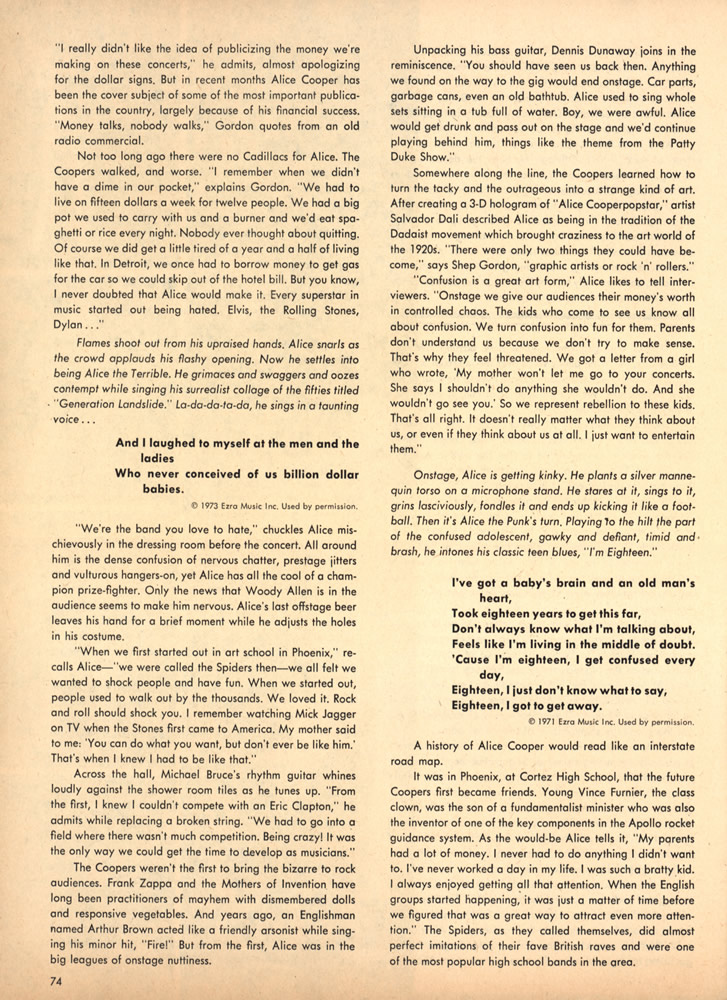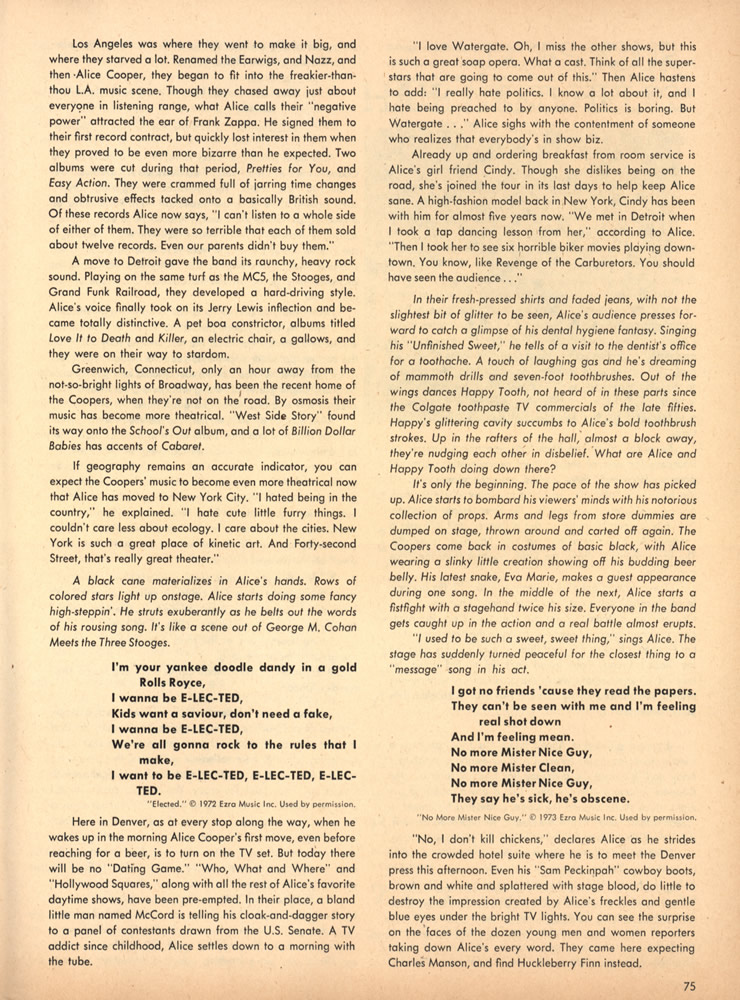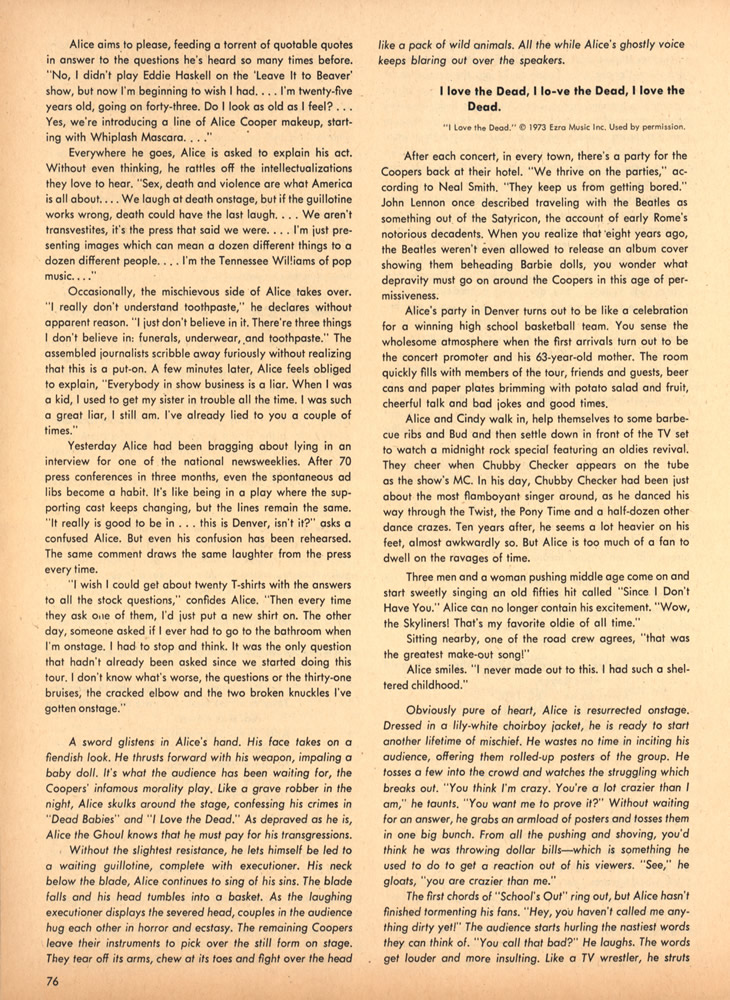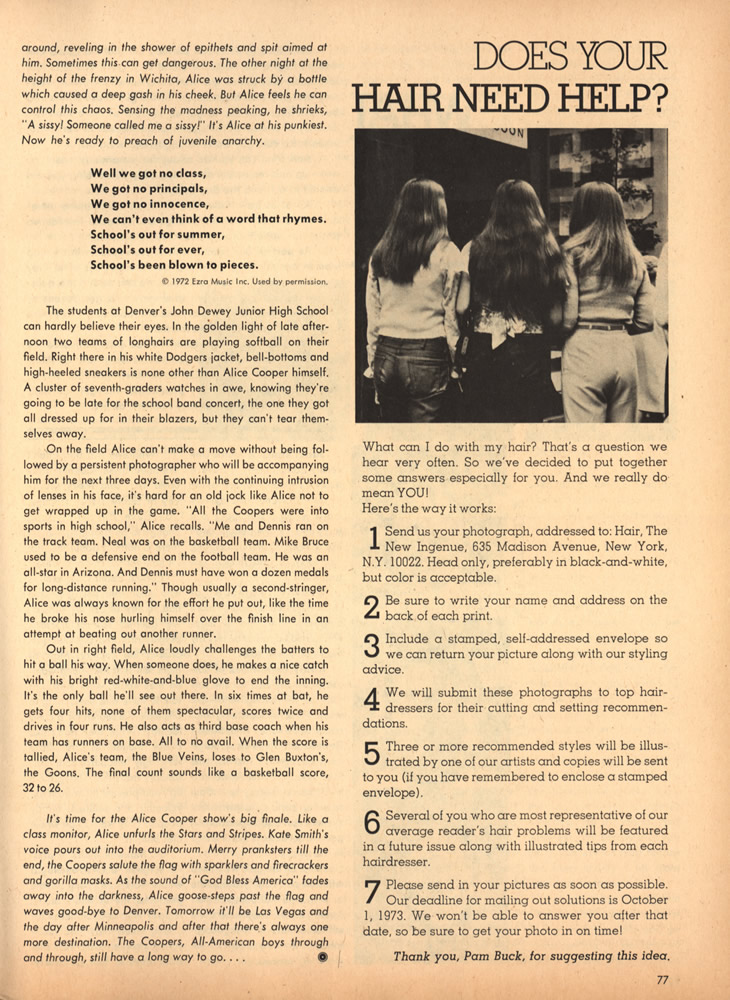Article Database
It's Super Man. It's Super Woman. It's Super Cooper
Love him or hate him, it's hard to escape Alice Cooper these days. If he's not staring down from a Times Square billboard, or being banned by TV stations across the country, or giying awards to Jack Benny and George Burns, or being immortalized by Salvador Dali, he's probably just appeared in your town and is blaring out of the nearest AM radio. Alice is the first to admit that he's the Dr. Jekyll and Mr. Hyde of rock 'n' roll. Offstage he begs the description of "nice guy" — friendly, good-natured, soft-spoken and down to earth. Onstage he becomes an ugly caricature of humanity, perverse and violent and funny and morbidly fascinating. Alice and the four charter members of the group love to tell journalists that they're the boys next door, acting out teenage America's fantasies. The writers shake their heads in disbelief. Repulsive and intriguing, brutal and gentlemanly, a study in opposites, and seemingly schizophrenic, can the Coopers really be the All-Americans they say they are?
"Ladies and gentlemen, we're now passing over old Dodge City," says the pilot's voice over the intercom on flight AC 1, the Alice Cooper Special. "There used to be a lot of fast guns down there. We're right over Boot Hill, where there's plenty who weren't fast enough."
Looking unbelievably clean-cut despite his permanent ten o'clock shadow and Medusa locks, Alice Cooper glances out the window. Disappointed to find the mythic locale of his favorite TV shows obscured by clouds, he takes a gulp from his ever-present can of Budweiser.
Though it's only three in the afternoon, Alice is already on his eighth beer of the day. Seldom falling below his quota of a case a day, Alice has got to be the world's biggest fan of what made St. Louis famous. When the makers of Budweiser were approached to see if they would want to decorate Alice's plane to look like a flying can of beer, their response was to ask whether Alice Cooper was an actress or a blond folk singer.
Boldly emblazoned with a red dollar sign on its tail, the Alice Cooper Electra is carrying 40 weary musicians and stage crew from Wichita to Denver on day 63 of what is being publicized as the biggest money-making rock 'n' roll tour to date. At times it must feel like a crazed marathon run. In order to top all previous records, Alice Cooper is playing 61 shows in 58 cities in 93 days. Three more weeks of madness to go, yet there isn't the slightest hint of tension on board.
In the middle of the plane, bass player Dennis Dunaway is carefully examining strings of bright glass beads while his girl friend Cindy, drummer Neal Smith's younger sister, works away at a hand loom on which she is weaving a beaded belt. Smiling broadly and exposing the braces on his teeth, Dennis proudly displays some of his handiwork: several pastel-colored beaded designs he adapted from a book titled Beadwork of the North American Indian. Exposed to the bead habit early in the tour, he's been hooked ever since.
In the rear lounge, the other members of the band and their girl friends are passing the time with a low-key game of blackjack. The stakes might as well be Monopoly money for all the emotion being expended on the game. Alice draws a 12. With his long blond hoir spioling onto the green velvet gambling table, Neal raises the ante by two chips. Alice sees him. Alice's girl friend, Cindy, a huge green eyeshade hiding her high cheekbones and short dark hair, gets another card and goes over 21. Alice draws a card. He's up to 18. He sticks. Neal takes one more card. 21. Dealer wins. Alice pops a sunflower seed in his mouth and takes another swig of beer.
On the next few hands, the band is joined by two of the equipment men wearing their block Billion Dollar Babies Tour T-shirts complete with dollar signs turned into two-headed snakes. With the sound of Burt Bacharach oozing out of the cassette machine, Alice's flying casino is like the calm in the eye of a hurricane.
Suddenly the plane goes into a dive. Just yesterday Alice was telling the Wichita Eagle's cub reporter, "I don't believe in any future," adding with a laugh, "I don't think our plane is going to make it to Denver." For a while it looks like he's going to be tragically prophetic. But melodrama is more Alice's style. Straight-faced, he announces to the other players, "If I win the next hand, the Coopers live long enough to see downtown Pittsburgh once again."
Lead guitarist Gien Buxton, recently operated on for a pancreas condition which nearly proved fatal, seems unconcerned. "The Coopers have already died forty-three times," he recalls. In his weird gamble with death, Alice wins the next hand. As the plane rights itself, Alice asks, "Will the Coopers go on and try for the refrigerator?" The game continues. The Coopers are still on a winning streak.
"Hello, Denver!"
Denver, in the person of ten thousand of its younger citizens, responds to the voice from the front of the packed arena. Onstage a gilded jungle gym and shiny silver store dummies vie for attention with the curly-headed M.C.
"Are you ready, Denver, for America's own Billion Dollar Babies? The legendary Alice Cooper!..."
Bomp, bomp-bomp... The thundering bass chords sound like the footsteps of a hulking monster. Drums and guitars can't compete with the wall of cheers which rises to greet a ghoulish figure in torn white tights and knee-high platform-heel leopard-skin boots. While his band plays on in their white silk formal suits, Alice Cooper's nasal punk whine builds into a throaty Broadway-style vocal...
Roll out! Roll out with your American dream and its recruits,
I've been ready.
Roll out! Roll out with your circus freaks and hula hoops,
I've been ready.
"We're just like the circus coming to town," remarks Alice Cooper's manager, Shep Gordon, in the black Cadillac limousine on the way to the concert that night. He doesn't have to add that Barnum & Bailey in their heyday would have had a hard time matching the spectacle of the Alice Cooper plane unloading its colorful rock 'n' roll menagerie. Or that in his own way, Alice probably provides as much horror and thrills onstage as the old-time freak shows which have all but disappeared from the modern big-top.
After all the tasteless commercial hype attached to the tour, Gordon seems surprisingly soft-spoken and restrained. "I really didn't like the idea of publicizing the money we're making on these concerts," he admits, almost apologizing for the doller signs. But in recent months Alice Cooper has been the cover subject of some of the most important publications in the country, largely because of his financial success. "Money talks, nobody walks," Gordon quotes from an old radio commercial.
Not too long ago there were no Cadillacs for Alice. The Coopers walked, and worse. "I remember when we didn't have a dime in our pocket," explains Gordon. "We had to live on fifteen dollars a week for twelve people. We had a big pot we used to carry with us and a burner and we'd eat spaghetti or rice every night. Nobody ever thought about quitting. Of course we did get a little tired of a year and a half of living like that. In Detroit, we once had to borrow money to get gas for the car so we could skip out of the hotel bill. But you know, I never doubted that Alice would make it. Every superstor in music started out being hated. Elvis, the Rolling Stones, Dylan..."
Flames shoot out from his upraised hands. Alice snarls as the crowd applouds his flashy opening. Now he settles into being Alice the Terrible. He grimaces and swaggers and oozes contempt while singing his surrealist collage of the fifties titled "Generation Landslide." La-da-da-ta-da, he sings in a tounting voice...
And I laughed to myself at the men and the ladies
Who never conceived of us billion dollar babies.
"We're the band you love to hate," chuckles Alice mischievously in the dressing room before the concert. All around him is the dense confusion of nervous chatter, prestage jitters and vulturous hangers-on, yet Alice has all the cool of a champion prize-fighter. Only the news that Woody Allen is in the audience seems to make him nervous. Alice's last offstage beer leaves his hand for a brief moment while he adjusts the holes in his costume.
"When we first started out in art school in Phoenix," recalls Alice — "we were called the Spiders then — we all felt we wanted to shock people and have fun. When we started out, people used to walk out by the thousands. We loved it. Rock and roll should shock you. I remember watching Mick Jagger on TV when the Stones first came to America. My mother said to me: 'You can do what you want, but don't ever be like him.' That's when I knew I had to be like that."
Across the hall, Michael Bruce's rhythm guitar whines loudly against the shower room tiles as he tunes up. "From the first, I knew I couldn't compete with an Eric Clapton," he admits while replacing a broken string. "We had to go into a field where there wasn't much competition. Being crazy! It was the only way we could get the time to develop as musicians."
The Coopers weren't the first to bring the bizarre to rock audiences. Frank Zappa and the Mothers of Invention have long been practitioners of mayhem with dismembered dolls and responsive vegetables. And years ago, an Englishman named Arthur Brown acted like a friendly arsonist while singing his minor hit, "Fire!" But from the first, Alice was in the big leagues of onstage nuttiness.
Unpacking his bass guitar, Dennis Dunaway joins in the reminiscence. "You should have seen us back then. Anything we found on the way to the gig would end onstage. Car parts, garbage cans, even an old bathtub. Alice used to sing whole sets sitting in a tub full of water. Boy, we were awful. Alice would get drunk and pass out on the stage and we'd continue playing behind him, things like the theme from the Patty Duke Show."
Somewhere along the line, the Coopers learned how to turn the tacky and the outrogeous into a strange kind of art. After creating a 3-D hologram of "Alice Cooperpopstar," artist Salvador Dali described Alice as being in the tradition of the Dadaist movement which brought craziness to the art world of the 1920s. "There were only two things they could have become," says Shep Gordon, "graphic artists or rock 'n' rollers."
"Confusion is a great art form," Alice likes to tell interviewers. "Onstage we give our audiences their money's worth in controlled chaos. The kids who come to see us know all about confusion. We turn confusion into fun for them. Parents don't understand us because we don't try to make sense. That's why they feel threatened. We got a letter from a girl who wrote, 'My mother won't let me go to your concerts. She says I shouldn't do anything she wouldn't do. And she wouldn't go see you.' So we represent rebellion to these kids. That's all right. It doesn't really matter what they think about us, or even if they think aboot us at all. I just want to entertain them."
Onstage, Alice is getting kinky. He plants a silver mannequin torso on a microphone stand. He stares at it, sings to it, grins lasciviously, fondles it and ends up kicking it like a Football. Then it's Alice the Punk's turn. Playing to the hilt the part of the confused adolescent, gawky and defiant, timid and brash, he intones his classic teen blues, "I'm Eighteen."
I've got a baby's brain and an old man's heart,
Took eighteen years to get this far,
Don't always know what I'm talking about,
Feels like I'm living in the middle of doubt.
'Cause I'm eighteen, I get confused every day,
Eighteen, I just don't know what to say, Eighteen, I got to get away.
A history of Alice Cooper would read like an interstate road map.
It was in Phoenix, at Cortez High School, that the future Coopers first become friends. Young Vince Furnier, the class clown, was the son of a fundamentalist minister who was also the inventor of one of the key components in the Apollo rocket guidance system. As the would-be Alice tells it, "My parents had a lot of money. I never had to do anything I didn't want to. I've never worked a day in my life. I was such a bratty kid. I always enjoyed getting all that attention. When the English groups started happening, it was just a matter of time before we figured that was a great way to attract even more attention." The Spiders, as they called themselves, did almast perfect imitations of their fave British raves and were one of the most popular high school bands in the area.
Los Angeles was where they went to make it big, and where they starved a lot. Renamed the Earwigs, and Nazz, and then Alice Cooper, they began to fit into the freakier-thanthou L.A. music scene. Though they chased away just about everyone in listening range, what Alice calls their "negative power" attracted the ear of Frank Zappa. He signed them to their first record contract, but quickly lost interest in them when they proved to be even more bizarre than he expected. Two albums were cut during that period, Pretties for You, and Easy Action. They were crammed full of jarring time changes and obtrusive effects tacked onto a basically British sound. Of these records Alice now says, "I can't listen to a whole side of either of them. They were so terrible that each of them sold about twelve records. Even our parents didn't buy them."
A move to Detroit gave the band its raunchy, heavy rock sound. Playing on the same turf as the MCS, the Stooges, and Grand Funk Railroad, they developed a hard-driving style. Alice's voice finally took on its Jerry Lewis inflection and became totally distinctive. A pet boa constrictor, albums titled Love It to Death and Killer, an electric chair, a gallows, and they were on their way to stardom.
Greenwich, Connecticut, only an hour away from the not-so-bright lights of Broadway, has been the recent home of the Coopers, when they're not on the road. By osmosis their music has become more theatrical. "West Side Story" found its way onto the School's Out album, and a lot of Billion Dollar Babies has accents of Cabaret.
If geography remains an accurate indicator, you can expect the Coopers' music to become even more theatrical now that Alice has moved to New York City. "I hated being in the country," he explained. "I hate cute little furry things. I couldn't care less about ecology. I care about the cities. New York is such a great place of kinetic art. And Forty-second Street, that's really great theater."
A black cane materializes in Alice's hands. Rows of colored stars light up onstage. Alice starts doing some fancy high-steppin'. He struts exuberantly as he belts out the words of his rousing song. It's like a scene out of George M. Cohan Meets the Three Stooges.
I'm your yankee doodle dandy in a gold Rolls Royce,
I wanna be E-LEC-TED,
Kids want a saviour, don't need a fake,
I wanna be E-LEC-TED,
We're all gonna rock to the rules that I make,
I want to be E-LEC-TED, E-LEC-TED, E-LECTED.
Here in Denver, as at every stop along the way, when he wakes up in the morning Alice Cooper's first move, even before reaching for a beer, is to turn on the TV set. But today there will be no "Dating Game." "Who, What and Where" and "Hollywood Squares," along with all the rest of Alice's favorite daytime shows, have been pre-empted. In their place, a bland little man named McCord is telling his cloak-and-dagger story to a panel of contestants drawn from the U.S. Senate. A TV addict since childhood, Alice settles down to a morning with the tube.
"I love Watergate. Oh, I miss the other shows, but this is such a great soap opera. What a cast. Think of all the superstars that are going to come out of this." Then Alice hastens to add: "I really hate politics. I know a lot about it, and I hate being preached to by anyone. Politics is boring. But Watergate... " Alice sighs with the contentment of someone who realizes that everybody's in show biz.
Already up end ordering breakfast from room service is Alice's girl friend Cindy. Though she dislikes being on the road, she's joined the tour in its last days to help keep Alice sane. A high-fashion model back in New York, Cindy has been with him for almost five years now. "We met in Detroit when I took a tap dancing lesson from her," according to Alice. "Then I took her to see six horrible biker movies playing downtown. You know, like Revenge of the Carburetors. You should have seen the audience..."
In their fresh-pressed shirts and faded jeans, with not the slightest bit of glitter to be seen, Alice's audience presses forward to catch a glimpse of his dental hygiene fantasy. Singing his "Unfinished Sweet," he tells of a visit to the dentist's office for a toothache. A touch of laughing gas and he's dreaming of mammoth drills and seven-foot toothbrushes. Out of the wings dances Happy Tooth, not heard of in these parts since the Colgate toothpaste TV commercials of the late fifties. Happy's glittering cavity succumbs to Alice's bold toothbrush strokes. Up in the rafters of the hall, almost a block away, they're nudging each other in disbelief. What are Alice and Happy Tooth doing down there?
It's only the beginning. The pace of the show has picked up. Alice starts to bombard his viewers' minds with his notorious collection of props. Arms and legs from store dummies are dumped on stage, thrown around and carted off again. The Coopers come back in costumes of basic black, with Alice wearing a slinky little creation showing off his budding beer belly. His latest snake, Eva Marie, makes a guest appearance during one song. In the middle of the next, Alice starts a fistfight with a stagehand twice his size. Everyone in the band gets caught up in the action and a real battle almost erupts.
"I used to be such a sweet, sweet thing," sings Alice. The stage has suddenly turned peaceful for the closest thing to a "message" song in his act.
I got no friends 'cause they read the papers.
They can't be seen with me and I'm feeling real shot down
And I'm feeling mean.
No more Mister Nice Guy,
No more Mister Clean,
No more Mister Nice Guy,
They say he's sick, he's obscene.
"No, I don't kill chickens," declares Alice as he strides into the crowded hotel suite where he is to meet the Denver press this afternoon. Even his "Sam Peckinpah" cowboy boots, brown and white and splattered with siege blood, do little to destroy the impression created by Alice's freckles and gentle blue eyes under the bright TV lights. You can see the surprise on the faces of the dozen young men and women reporters taking down Alice's every word. They came here expecting Charles Manson, and find Huckleberry Finn instead.
Alice aims to please, feeding a torrent of quotable quotes in answer to the questions he's heard so many times before. "No, I didn't play Eddie Haskell on the 'Leave It to Beaver' show, but now I'm beginning to wish I had.... I'm twenty-five years old, going on forty-three. Do I look as old as I feel?... Yes, we're introducing a line of Alice Cooper makeup, starting with Whiplash Mascara.... "
Everywhere he goes, Alice is asked to explain his act. Without even thinking, he rattles off the intellectualizations they love to hear. "Sex, death and violence are what America is all about.... We laugh at death onstage, but if the guillotine works wrong, death could have the last laugh.... We aren't transvestites, it's the press that said we were.... I'm just presenting images which can mean a dozen different things to a dozen different people.... I'm the Tennessee Williams of popmusic...."
Occasionally, the mischievous side of Alice takes over. "I really don't understand toothpaste," he declares without apparent reason. "I just don't believe in it. There're three things I don't believe in: funerals, underwear, and toothpaste." The assembled journalists scribble away furiously without realizing that this is a put-on. A few minutes later, Alice feels obliged to explain, "Everybody in show business is a liar. When I was a kid, I used to get my sister in trouble all the time. I was such a great liar, I still am. I've already lied to you a couple of times."
Yesterday Alice had been bragging about lying in an interview for one of the national newsweeklies. After 70 press conferences in three months, even the spontaneous ad libs become a habit. It's like being in a play where the supporting cast keeps changing, but the lines remain the same. "It really is good to be in... this is Denver, isn't it?" asks a confused Alice. But even his confusion has been rehearsed. The same comment draws the same laughter from the press every time.
"I wish I could get about twenty T-shirts with the answers to all the stock questions," confides Alice. "Then every time they ask one of them, I'd just put a new shirt on. The other day, someone asked if I ever had to go to the bathroom when I'm onstage. I had to stop and think. It was the only question that hadn't already been asked since we started doing this tour. I don't know what's worse, the questions or the thirty-one bruises, the cracked elbow and the two broken knuckles I've gotten onstage."
A sword glistens in Alice's hand. His face takes on a fiendish look. He thrusts forward with his weapon, impaling a boby doll. It's what the oudience has been waiting for, the Coopers' infamous morality play. Like a grave robber in the night, Alice skulks around the stage, confessing his crimes in "Deod Babies" and "I Love the Dead." As depraved as he is, Alice the Ghoul knows that he must pay for his transgressions.
Without the slightest resistonce, he lets himself be led to a waiting guillotine, complete with executioner. His neck below the blade, Alice continues to sing of his sins. The blade falls and his head tumbles into a basket. As the laughing executioner displays the severed head, couples in the audience hug each other in horror and ecstasy. The remaining Coopers leave their instruments to pick over the still form on stage. They tear off its arms, chew at its toes and fight over the head like a pack of wild animals. All the while Alice's ghostly voice keeps bloring out over the speokers.
I love the Dead, I love the Dead, I love the dead.
After each concert, in every town, there's a porty for the Coopers back at their hotel. "We thrive on the parties," occording to Neal Smith. "They keep us from getting bored." John Lennon once described traveling with the Beatles as something out of the Satyricon, the occount of early Rome's notorious decadents. When you realize that eight years ago, the Beatles weren't even allowed to release an album cover showing them beheading Barbie dolls, you wonder what depravity must go on around the Coopers in this age of permissiveness.
Alice's party in Denver turns out to be like a celebration for a winning high school bosketball team. You sense the wholesome atmosphere when the first arrivols turn out to be the concert promoter and his 63-year-old mother. The room quickly fills with members of the tour, friends ond guests, beer cans and paper plates brimming with potato salad and fruit, cheerful talk and bad jokes and good times.
Alice and Cindy walk in, help themselves to some barbecue ribs and Bud and then settle down in front of the TV set to watch a midnight rock special featuring an oldies revival. They cheer when Chubby Checker appears on the tube as the show's MC. In his day, Chubby Checker had been just about the most flamboyant singer around, as he danced his way through the Twist, the Pony Time and a half-dozen other dance crazes. Ten years ofter, he seems a lot heavier on his feet, almost awkwardly so. But Alice is too much of a fan to dwell on the ravages of time.
Three men and a woman pushing middle age come on and start sweetly singing an old fifties hit called "Since I Don't Have You." Alice can no longer contain his excitement. "Wow, the Skyliners! That's my favorite oldie of all time."
Sitting nearby, one of the road crew agrees, "that was the greatest make-out song!"
Alice smiles. "I never made out to this. I had such a sheltered childhood."
Obviously pure of heart, Alice is resurrected onstage. Dressed in a lily-white choirboy jacket, he is ready to start another lifetime of mischief. He wastes no time in inciting his audience, offering them rolled-up posters of the group. He tosses a few into the crowd and watches the struggling which breaks out. "You think I'm crozy. You're a lot crazier than I am," he taunts. "You want me to prove it?" Without waiting for an answer, he grabs an armload of posters and tosses them in one big bunch. From all the pushing and shoving, you'd think he was throwing dollor bills — which is something he used to do to get a reaction out of his viewers. "See," he gloats, "you are crazier than me."
The first chords oF "School's Out" ring out, but Alice hasn't finished tormenting his fans. "Hey, you haven't colled me anything dirty yet!" The audience starts hurling the nastiest words they can think of. "You call that bad?" He laughs. The words get louder and more insulting. Like a TV wrestler, he struts around, reveling in the shower of epithets and spit aimed at him. Sometimes this can get dangerous. The other night at the height of the frenzy in Wichita, Alice was struck by a bottle which caused a deep gash in his cheek. But Alice feels he can control this chaos. Sensing the madness peaking, he shrieks, "A sissy! Someone called me a sissy!" It's Alice at his punkiest. Now he's ready to preach of juvenile anarchy.
Well we got no dass,
We got no principals,
We got no innocence,
We can't even think of a word that rhymes.
School's out for summer,
School's out for ever,
School's been blown to pieces.
The students at Denver's John Dewey Junior High School can hardly believe their eyes. In the golden light of late afternoon two teams of longhairs are playing softball on their fleld. Right there in his white Dodgers jacket, bell-bottoms and high-heeled sneakers is none other than Alice Cooper himself. A cluster of seventh-graders watches in awe, knowing they're going to be lote for the school band concert, the one they got all dressed up for in their blazers, but they can't tear themselves away.
On the field Alice can't make a move without being followed by a persistent photographer who will be accompanying him for the next three days. Even with the continuing intrusion of lenses in his face, it's hard for an old jock like Alice not to get wrapped up in the game. "All the Coopers were into sports in high school," Alice recalls. "Me and Dennis ran on the track team. Neal was on the basketball team. Mike Bruce used to be a defensive end on the football team. He was an all-star in Arizona. And Dennis must have won a dozen medals for long-distance running." Though usually a second-stringer, Alice was always known for the effort he put out, like the time he broke his nose hurling himself over the flnish line in an attempt at beating out another runner.
Out in right fleld, Alice loudly challenges the batters to hit a ball his way. When someone does, he makes a nice catch with his bright red-white-and-blue glove to end the inning. It's the only ball he'll see out there. In six times at bat, he gets four hits, none of them spectacular, scores twice and drives in four runs. He also acts as third base coach when his team has runners on base. All to no avail. When the score is tallied, Alice's team, the Blue Veins, loses to Glen Buxton's, the Goons. The final count sounds like a basketball score, 32 to 26.
It's time for the Alice Cooper show's big finale. Like a class monitor, Alice unfurls the Stars and Stripes. Kate Smith's voice pours out into the auditorium. Merry pranksters till the end, the Coopers salute the flag with sparklers and firecrackers and gorilla masks. As the sound of "God Bless America" fades away into the darkness, Alice goose-steps past the flag and waves good-bye to Denver. Tomorrow it'll be Las Vegas and the day after Minneapolis and after that there's always one more destination. The Coopers, All-American boys through and through, still have a long way to go....





